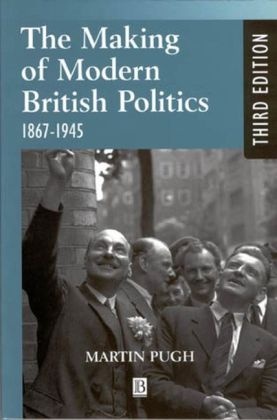Read more
Informationen zum Autor Martin Pugh is Research Professor in History at Liverpool John Moores University. His previous books include Electoral Reform in War and Peace (1978), The Tories and the People (1985), Women and the Women's Movement in Britain (1992) and The March of the Women: a revisionist analysis of the women's suffrage movement (2000). He is also the editor of Blackwell Publishers' Companion to Modern European History, 1871-1945 (1997). Klappentext Since its first publication in 1982, The Making of Modern British Politics' has been widely acclaimed as the most sophisticated account of changes in British political history between the 1860s and the outbreak of the Second World War. For the third edition, the text has been extended to cover the politics of the Second World War and the election of 1945, following through to a more satisfying conclusion the changes of the last decades of the nineteenth century. The book focuses on the problems of interpretation and analysis raised by the most recent work in the field. Several of the existing chapters have been revised in light of the latest research, particularly the material on Edwardian electoral politics and the high politics of 1918-1931. The new edition also incorporates current thinking on the Popular Front and Fascism, and looks at how the Labour Party evolved into a national rather than sectional party by recruiting Conservative voters and politicians into its ranks. Zusammenfassung * Third edition of this insightful survey of changes in British politics. * Now extended to cover the politics of the Second World War and the election of 1945. * Extensively revised in the light of recent research. * Looks at the Labour Partya s evolution into a national rather than sectional party. Inhaltsverzeichnis List of Tables viii List of Illustrations x Preface xi Part One 1867-1900 1 1 Party and Participation 1867-1900 3 Voting and Non-voting 4 Electoral Practice and Malpractice 10 The Rise of the Party Activist 14 Party, Parliament and the 'Independent Member' 17 2 The Evolution of the Gladstonian Liberal Party 1867-1895 22 Liberalism, Reform and Religion 23 The Building Blocks of Liberalism 25 The Programme versus the Single Issue 30 1886: The Radicalization of the Party 35 3 The Conservative Revival 1874-1900 42 The Impact of Middle-class Conservatism 44 Organizing the Democracy 48 Tradition and Change 51 Salisbury and Liberal Unionism 54 The State and Social Reform 59 4 The Social Roots of Political Change in Late Victorian Britain 65 Trends and Issues 66 Rural Radicalism 70 Working-class Politics and Socialists 73 Women, Politics and Labour 78 Working-class Conservatism, Empire and Patriotism 80 The Lower Middle Class 86 Part Two 1895-1914 89 5 The Edwardian Crises 1895-1914 91 The Waning of Radicalism 91 Liberal Imperialism 96 'National Efficiency' and Tariff Reform 99 The Crisis of Conservatism 103 6 Edwardian Progressivism 107 Origins of the New Liberalism 107 The Politics of the Pact 1903-1914 115 Edwardian Labourism 123 The Workers and State Welfare 129 7 The Electoral Struggle 1906-1914 130 The Containment of Labour 131 The Franchise Factor 135 Regional Political Culture 138 The Unions, MacDonald and the Pact 1911-1914 141 Part Three 1914-1920s 147 8 The Impact of the Great War on British Politics 149 The Disintegration of the Progressive Alliance 1914-1916 151 Lloyd George and the C...

